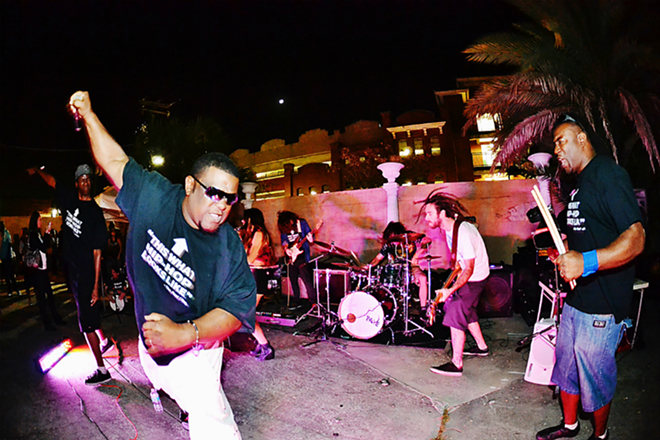Sometimes, seeing a local act perform without having any expectations beforehand pays off. On very rare occasions, you’re left reeling, struck by a sense of revelation — the feeling that you’re witnessing fresh uncharted talent that could blow up and out of the scene at any moment.
That’s how I felt when I discovered The Real Clash. I’d stopped to hear them out of curiosity: Just how good could a hip-hop ensemble from St. Petersburg College actually be?
I was captivated within the first few minutes.
The instrumentalists were focused and locked in tight. They knew how to step back and let things breathe while the two verse-trading emcees and sultry-voiced vocalist took the spotlight, and when to step in and turn the mix and energy up. The nine-piece held it down like pros in a way that seemed effortless, demonstrating the sort of easy chemistry and dynamic stage presence that some veteran bands still have trouble achieving, and brimmed with an infectious exuberance and upbeat vigor that filled the room.
I had to find out more.
The Real Clash grew out of SPC’s two-year Music Industry Recording Arts (MIRA) program, which is dedicated to delivering real-world training to its students, all within a collaborative environment.
Lead instructor and department administrator Mark Matthews designed the program from scratch more than six years ago, drawing from a wellspring of experience writing music for film and TV in LA. He’s made a point of only hiring educators with professional credibility.
“Not to put academics down, because they can teach you how to play and how to be a good musician, but it’s hard for somebody who’s never been out there to teach you how to make a living as a musician,” Matthews asserts.
MIRA students gain relevant skills and insight generally missing from bigger pricier schools like Full Sail, not to mention free access to three versatile state-of-the-art audio production suites/classrooms.
“These students need to know what they’re up against when they get out there. And every single person we have on staff has ‘made a noise for money.’”
MIRA courses are organized so that students from all three “specialty tracks” (performance, composition and production) are required to work with students in contrasting tracks, using what they’ve learned about technology and recording to collaborate on live campus showcases and MIRA compilation CDs issued at each semester’s end. Students learn how to manage projects in both live and studio settings, how to seek out the right people to get desired results (which means enlisting help from artists outside their specialty), and how to be successful when working with people they may not know or like.
“Once you get to Tech 4, the last semester of the program, you’ve worked with, if not everyone there, then alongside them, and you’ve grown and evolved together,” explains The Real Clash’s frontman/lyricist Rashad “Shadcore” Harrell. This means that most of the Real Clash members had already established working relationships before they were approached to join the ensemble co-founded by Rashad and fellow MIRA producer/lyricist Jay “Jay Acolyte” Wilson.
The twosome originally planned to follow the school’s already-existing model for rock and jazz ensembles: establish the curriculum for hip-hop, then pass the torch to a new group after a semester. But they wanted to write their own material. “That’s what made us different from the jump,” says Rashad. “All the other ensembles do covers; we wanted to do original compositions.”
They also wanted to enlist real instrumentalists. “I always felt like there was something more that could happen from having a live band behind you. The energy is just different,” Jay stresses, and Rashad agrees. “It’s just more electrifying with those live acoustic sounds coming from behind your ears. And there’s so much more you can do on the fly.”
They didn’t want just anybody to sign up, however, so they brainstormed a wish list of potential candidates and began reaching out. Everyone they contacted came on board, and the lineup has remained almost the same to this day, with the exception of recently added keyboardist Jordan Walker.
Months later, they’d written, played and recorded some first-rate material, delivered buzz-worthy performances around the SPC campus, and were trying to figure out what to do once the semester was done and credit earned. Their creativity was still flowing, chemistry swiftly growing, everyone was having a good time, so why quit?
“You will be doing yourself a disservice if you cut it off after this semester is over,” Rashad remembers Matthews saying after he saw the ensemble perform at a campus event. “You should take it outside of these four walls.” Matthews’ encouragement solidified the band’s decision to make The Real Clash a full-fledged (off-campus) group.
“The Real Clash are representative of our goal — to teach the kids how to band together,” Matthews explains. “What I really love about it, and the payoff for me, is that they did it themselves. We provided the forum, we provided the room for them to rehearse, and we provide a mentor, in their case [SPC instructor and La Lucha bassist] Alejandro Areñas. But they wrote all their own material, they worked at it, perfected it, and brought it out to the public, and the public likes it. What’s more perfect than that?”


